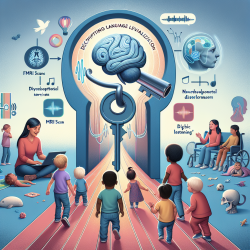Unveiling the Gaps: Parent and Provider Discrepancies in Identifying Mental Health Concerns
As a Special Education Director, ensuring that children with neurologic disorders receive comprehensive care is a top priority. A recent study titled "Parent and Provider Differences in Ratings of Mental Health and Neurodevelopmental Concerns in Children with Neurologic Disorders" sheds light on the discrepancies between parents and providers in identifying mental health and neurodevelopmental concerns. This study, published in the Journal of Clinical Psychology in Medical Settings, highlights the need for improved communication and assessment strategies among care team members.
The Study: An Overview
The study conducted a retrospective chart review of 129 children with neurologic disorders, such as traumatic brain injury and epilepsy, who were referred for neuropsychological evaluations. The researchers aimed to explore the interrater agreement between referring providers, parents, and pediatric neuropsychologists in detecting mental health and neurodevelopmental concerns.
Key Findings
- There was low interrater agreement for mental health concerns, with a kappa coefficient of 0.324, indicating poor agreement.
- Better agreement was found for neurodevelopmental concerns, with a kappa coefficient of 0.511.
- Referring providers and parents showed low sensitivity in identifying concerns, with sensitivity scores of 0.326 and 0.366, respectively.
Implications for Practitioners
These findings highlight the importance of comprehensive assessment strategies that incorporate multiple perspectives. As practitioners, it is crucial to recognize the value of both parent and provider insights. Parents provide unique observations of their child's daily life, while providers offer clinical expertise. Bridging the gap between these perspectives can lead to more accurate diagnoses and tailored interventions.
Recommendations for Improvement
To improve the identification and management of mental health and neurodevelopmental concerns in children with neurologic disorders, practitioners can consider the following strategies:
- Enhanced Communication: Foster open communication channels between parents and providers to ensure that all concerns are addressed.
- Comprehensive Assessments: Utilize multimethod, multi-informant assessments that include input from parents, teachers, and other caregivers.
- Training and Education: Provide training for parents and providers to improve their ability to recognize and report mental health and neurodevelopmental symptoms.
Encouraging Further Research
While this study provides valuable insights, further research is needed to explore the factors contributing to discrepancies in ratings and to develop standardized assessment tools. Practitioners are encouraged to engage in ongoing research and professional development to stay informed about the latest findings and best practices.
To read the original research paper, please follow this link: Parent and Provider Differences in Ratings of Mental Health and Neurodevelopmental Concerns in Children with Neurologic Disorders.










